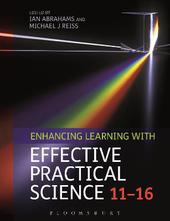
|
Enhancing Learning with Effective Practical Science 11-16
Hardback
Main Details
| Title |
Enhancing Learning with Effective Practical Science 11-16
|
| Authors and Contributors |
Edited by Dr Ian Abrahams
|
|
Edited by Professor Michael J. Reiss
|
| Physical Properties |
| Format:Hardback | | Pages:280 | | Dimensions(mm): Height 246,Width 189 |
|
| ISBN/Barcode |
9781472592286
|
| Classifications | Dewey:507.12 |
|---|
| Audience | | Tertiary Education (US: College) | | Professional & Vocational | |
|---|
| Illustrations |
56 bw illus
|
|
Publishing Details |
| Publisher |
Bloomsbury Publishing PLC
|
| Imprint |
Bloomsbury Academic
|
| Publication Date |
15 December 2016 |
| Publication Country |
United Kingdom
|
Description
Enhancing Learning with Effective Practical Science begins with an exploration of the reasons why practical work is often less effective than it could be. It provides 72 full and clear lesson guides for effective practical lessons in biology, chemistry and physics for students aged between 11 and 16. Each lesson guide presents the practical work to be undertaken, the apparatus and materials required and the ideas to be explored. Health and safety issues are also covered. Essential reading for trainee science teachers, and practising teachers looking to enhance their teaching through effective use of practical work, especially if teaching outside their science specialism.
Author Biography
Ian Abrahams is Professor of Science Education at the University of Lincoln, UK. Michael J. Reiss is Professor of Science Education at IOE, UCL's Faculty of Education and Society, University College London, UK.
ReviewsWith its clear structure and concise chapters, this book should be within reach of every science teacher in my view. No matter how many years you have been teaching science, this book really is one of the best practical resources I have come across ... It is a valuable resource that can be used time and again in the classroom. * School Science Review * This book is both timely and useful ... had a positive effect on my practice and the learning of my students. * Royal Society of Chemistry * This guide to making practical science more effective, in order to enhance the learning experience, will be welcomed by both new and established science teachers and should feature in the libraries of all teacher-training institutions. * The Biologist * This book demonstrates the value of using education research to inform the practice of science teaching in schools. It presents a thoughtful and accessible approach to improving the effectiveness of practical work in the science classroom. * Jim Ryder, Professor of Science Education, University of Leeds, UK * This practical manual is really useful as it guides the science practical practitioner. Furthermore, it is grounded by the age-old debate about the added value of doing practical work in science lessons. The effectiveness matrix enables the teacher to plan the teaching and learning that will promote learning and understanding of the science. The Secretary for State for Education wants evidence-based practice: this book delivers on that front too! * Lyn Haynes, Senior Lecturer, School of Teacher Education and Development, Canterbury Christ Church University, UK * This book provides a large collection of practical activities for secondary science, many familiar to teachers, some less so. The distinctive feature of this book is its use of the 2x2 'effectiveness matrix' ... Abrahams and Reiss acknowledge that the effectiveness of a practical activity is not determined by the activity itself but by how it is implemented in the classroom. Their book provides a framework that can help teachers to implement practical science activities more thoughtfully, so that more of their students succeed in doing and learning what is intended. * Robin Millar, Emeritus Professor of Science Education, University of York, UK * The teaching of science in schools and universities rests on a blind faith in the value of 'practical work'. This book takes a close look at the evidence to show that there is far too much 'hands on' and not enough 'minds on'. Building on an extensive program of research, it shows how to make practical work a more effective learning experience offering 72 examples. In doing so, it injects a much needed breath of fresh air questioning many long held myths about practical work. It should be compulsory reading for every practising teacher of science. * Jonathan Osborne, Kamalachari Professor of Science Education, Graduate School of Education, Stanford University, USA * Practical work has long been a core feature of science lessons in the secondary school, yet there is much evidence from research that school practicals are often ineffective at helping students learn the key concepts that the laboratory or fieldwork is meant to introduce or illustrate. Despite this, science teachers are generally committed to practical work, and with good reason. The very essence of science - as something distinct from philosophy on the one hand and craftwork on the other - is the interplay between theory and systematically examined empirical evidence. An authentic science education gives learners experience of this back-and-forth between ideas and experience, and yet it is just this interplay that often gets missed when students engage in practical work. Michael Reiss and Ian Abrahams have here put together a resource for classroom teachers that will support effective practical work in the secondary school. Drawing upon both research and the expertise of biology, chemistry and physics education specialists, this book sets out the core principles behind effective science practical work, and exemplifies these with a wide range of examples of practicals suitable for 'minds-on' (as well as hands-on) student activities. This book is likely to prove insightful and invaluable to all teachers of secondary science. * Keith S. Taber, Professor of Science Education, University of Cambridge, UK *
|